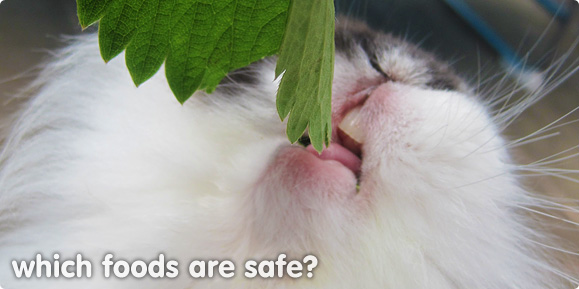Safe fruit, vegetables, herbs and plants suitable for rabbits

Rabbits love their food and enjoy fresh fruits and vegetables as part of a balanced diet. The main part of a rabbit’s diet should be unlimited amounts of fresh hay (preferably Timothy or Meadow Hay), grass, and plenty of clean water available. See 'What do rabbits eat?' for more information.
When introducing any new food, always do so slowly over a few weeks to avoid digestive upsets. Rabbits, like humans are all different and as such some may be unable to tolerate certain foods. Only give a small amount and wait for 24 hours, if your rabbit produces soft poo, withdraw the food and try with something else after everything has settled back to normal. Allow 5 - 7 days before making any other additions. Always wash food first and don't feed plants from roadsides or that contain pesticides.
The first rule of feeding bunnies and their delicate tummies is: if in doubt - don't let them eat it! Rabbits have strong tastebuds and will try anything even if it's poisonous - it's up to you to protect them! The following list was taken from the RWAF website.
Which vegetables can rabbits eat?
A good guideline is to feed a minimum of 1 cup of vegetables for each 4 lbs of body weight per day.
- Artichoke leaves
- Asparagus
- Baby Sweetcorns (but not full size ones)
- Beetroot (care with leafy tops as high levels of oxalic acid) - can cause gas so limit
- Broccoli (and its leaves, including purple sprouting varieties) - can cause gas so limit
- Brussel Sprouts (leaves and sprouts) - can cause gas so limit
- Cabbage (can sometimes cause digestive upsets) - can cause gas so limit
- Carrots (& carrot tops) – not the roots as they are high in sugars. Carrots should be limited due to high sugar content.
- Cauliflower (and the leaves)
- Celeriac
- Celery leaves
- Chicory
- Courgette (and flowers)
- Cucumber
- Curly Kale
- Fennel
- Green beans
- Kohl rabi
- Peas (including the leaves and pods)
- Peppers (red, green and yellow)
- Pumpkin
- Radish Tops - can cause gas so limit
- Rocket (also known as Arugula)
- Romaine lettuce (not Iceberg or light coloured leaf)
- Spinach (only occasional)
- Spring Greens
- Squash (e.g. Butternut)
- Swede
- Turnip (only occasional)
- Watercress
Which fruits can rabbits eat?
Fruits should be fed in moderation due to sugar content (up to 2 tablespoons worth per day).
Do not feed the pips, stones, plants etc of fruits unless otherwise stated, as most of the time they are poisonous! Rabbits love sugary fruit and will eat too much of it, which is bad for them. Therefore it's up to you to limit it!
- Apple (not the pips - they are poisonous!)
- Apricot
- Banana (high in potassium)
- Blackberries (and leaves – excellent astringent properties)
- Blueberries
- Cherries (not the pits and plant - they contain cyanide and are therefore poisonous!)
- Grapes
- Kiwi Fruit
- Mango
- Melon
- Nectarines
- Papaya
- Peaches
- Pears
- Pineapple
- Plums
- Raspberries (and leaves – excellent astringent properties)
- Strawberries (and leaves)
- Tomatoes (NOT the leaves)
Safe herbs for bunnies
They can taste very strong so offer a little to start with to get your bunnies used to them.
- Basil
- Coriander (also known as Cilantro
- Dill
- Mint (peppermint)
- Parsley - not too much as high in calcium
- Oregano
- Rosemary
- Sage
- Thyme
Wild garden herbs, weeds and flowers that rabbits can eat
Double-check which plants are in your garden before letting your bunnies loose!
- Borage
- Calendula
- Camomile
- Chickweed (astringent)
- Clover (leaves and flowers)
- Coltsfoot
- Comfrey
- Dandelion (diuretic properties)
- Goosegrass (cleavers) but may stick to coat!
- Lavender
- Mallow
- Nettle
- Nasturtium (leaves and flowers)
- Shepherd’s purse
- Sow Thistle
- Plantain
- Yarrow
You can see a list of some poisonous plants by clicking here.
